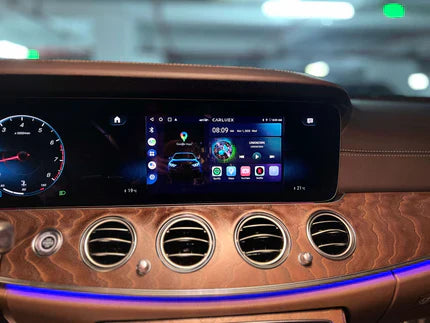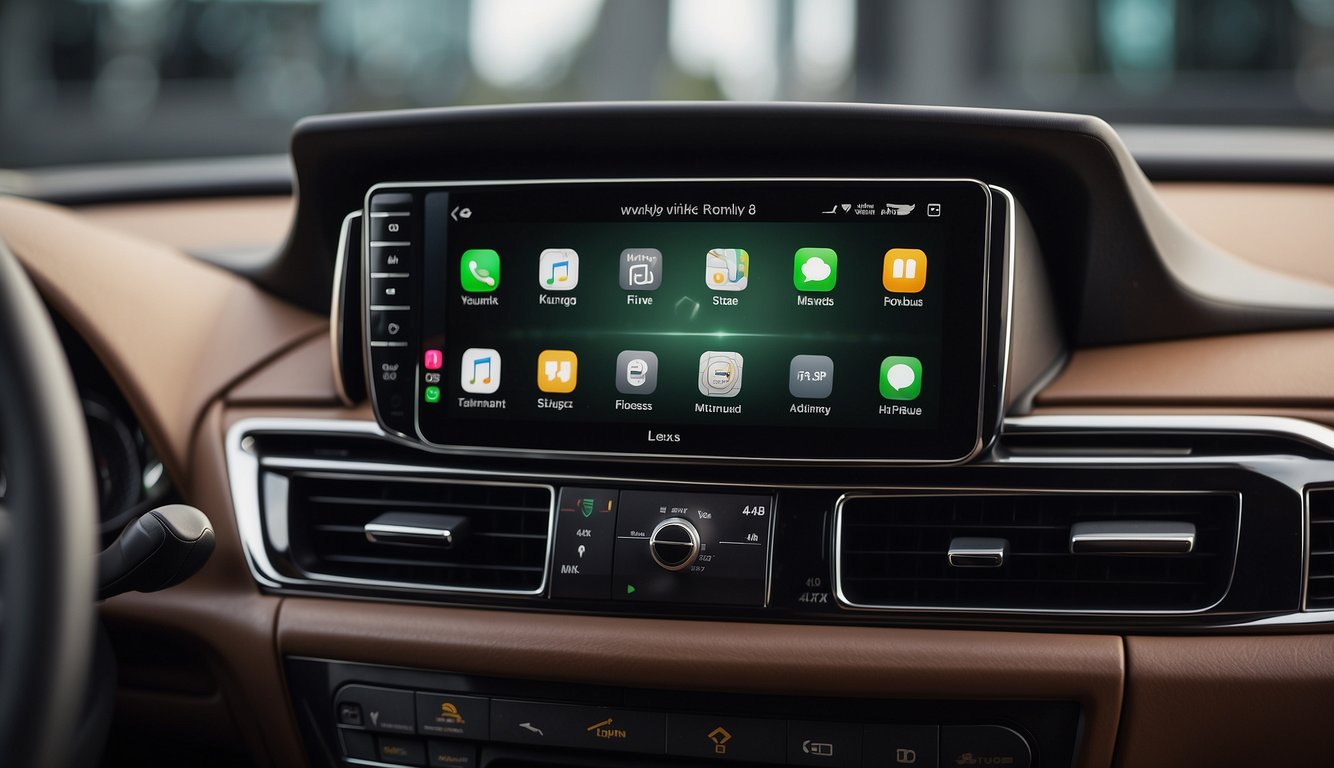Looking to download Apple CarPlay? You're in the right place.
Apple CarPlay is a smarter, safer way to use your iPhone while driving. With CarPlay, you can get directions, make calls, send and receive messages, and enjoy your favorite music on your car's built-in display.
To get Apple CarPlay, you don't actually need to download it separately. If your car supports CarPlay, it’s as simple as connecting your iPhone to your car using a USB cable or wirelessly.
From there, CarPlay takes over and lets you control everything with voice commands through Siri or your car's touchscreen.
Installing and customizing CarPlay apps is straightforward.
You'll be able to use apps you already love, like Apple Maps and Spotify, in a way that’s optimized for on-the-road use.
Interested in getting started? Learn how to set up CarPlay and explore its features today.
Setting Up Apple CarPlay

To set up Apple CarPlay, you need to check if your car and iPhone are compatible, follow the right installation steps, and connect your iPhone properly.
Compatibility and Requirements
To use Apple CarPlay, your car must support it. Most newer car models from 2016 onwards come with CarPlay support.
You also need an iPhone 5 or later running iOS 7.1 or higher.
You can check your car’s manual or the manufacturer's website for CarPlay compatibility.
Make sure Siri is enabled on your iPhone since CarPlay relies on it for voice commands.
Having a reliable USB cable is also essential for cars that require a wired connection. Some newer cars support wireless connections via Bluetooth and Wi-Fi.
Installation Process
First, make sure your car is parked and the engine is on.
For wired connections, plug your iPhone into the car’s USB port using a Lightning to USB cable. The USB port often has a CarPlay icon or a smartphone icon.
If your car supports wireless CarPlay, activate Bluetooth and Wi-Fi on your iPhone.
Then, hold the voice command button on your steering wheel. Your car’s display should prompt you to pair your iPhone.
Follow the on-screen instructions on both your car and iPhone to complete the setup.
You might need to grant some permissions for your car to access your iPhone’s features.
Connecting Your iPhone
For a wired connection, plug your iPhone into the designated USB port. Your car’s screen should automatically display the CarPlay interface.
If it doesn’t, select the CarPlay option from the car’s infotainment system menu.
For wireless connectivity, ensure both Bluetooth and Wi-Fi are enabled on your iPhone.
Your car may automatically detect your iPhone, or you might have to select it from the car’s Bluetooth or Wi-Fi settings menu.
Once connected, you can use apps like Maps, Messages, and Music through CarPlay.
Make sure to keep your iPhone updated to the latest iOS version to ensure the best performance.
Using Apple CarPlay

Apple CarPlay allows you to make calls, send messages, navigate, and enjoy music using your car’s display. It integrates with Siri and various apps to enhance your driving experience.
Making Calls and Sending Messages
Using CarPlay, you can make calls and send messages without taking your hands off the wheel.
Siri enables voice control, so you can say commands like "Call Mom" or "Send a message to John."
If preferred, the touchscreen also allows you to tap on Contacts or use the Phone app.
Incoming messages are read aloud by Siri, and you can reply by dictating your response.
This feature helps you stay connected while driving safely.
Navigating with Maps and Directions
CarPlay supports navigation apps like Apple Maps and third-party options like Google Maps.
You can ask Siri for directions by saying, "Get directions to the nearest gas station," and the map will display on your car’s screen.
The directions update in real-time, giving you the best route considering traffic conditions.
You can also use the touchscreen to enter destinations or search for nearby points of interest. This makes finding your way easy and efficient.
Enjoying Music and Other Media
With CarPlay, you can enjoy your favorite music, podcasts, and audiobooks while driving.
CarPlay supports apps like Apple Music and Spotify.
Use Siri to play specific songs, artists, or albums by saying, "Play The Beatles," or access your playlists using the display.
Touch controls let you browse through your audio apps.
Whether it’s relaxing music, engaging podcasts, or interesting audiobooks, CarPlay ensures you have a pleasurable audio experience on the road.
Advanced Features and Customization

Apple CarPlay offers a wide range of advanced features and customization options.
Users can leverage voice commands with Siri, integrate and use apps, and personalize their CarPlay experience to suit their needs.
Leveraging Siri and Voice Commands
Utilize Siri for hands-free control over your iPhone. Activate Siri by pressing the voice command button on your steering wheel.
Voice commands allow you to make calls, send messages, and get navigation help without taking your hands off the wheel.
Siri can also read out your notifications and Siri Suggestions, helping you stay updated on important events and tasks.
Siri integrates well with apps like Calendar, Mail, and Apple Music, which can be managed through simple voice prompts.
Using Apps and Integration
CarPlay supports a variety of third-party apps, including navigation and music apps like Google Maps, Waze, and Spotify.
You can also use CarPlay to control Apple Music, managing your playlists and albums with ease.
Additionally, you can access Dolby Atmos for a better listening experience if you have an Apple Music subscription.
For effective navigation, CarPlay syncs with your iPhone applications, ensuring you have up-to-date maps and routing information.
SharePlay allows you to share music or videos during your drive, enhancing the in-car experience.
Personalizing Your CarPlay Experience
Customize your CarPlay dashboard to reflect your preferences.
Choose and arrange your favorite CarPlay apps, and select custom wallpapers to give your interface a personal touch.
You can add or remove apps by tapping General > CarPlay on your iPhone, then selecting your car and using the plus (+) or minus (-) signs.
You can rearrange apps by dragging them into your preferred order.
To improve connectivity, make sure you use a good quality lightning cable.
For more personalisation options and troubleshooting, refer to Apple Support.
This ensures your CarPlay experience remains seamless and tailored to your needs.
Troubleshooting and Support
Having trouble with Apple CarPlay can be frustrating, but there are straightforward solutions to many common issues.
Ensuring CarPlay is up to date and getting help from Apple Support if needed can resolve most problems.
Common Issues and Solutions
If CarPlay isn't working, several common issues might be causing the problem.
Siri needs to be enabled for CarPlay to work.
Make sure your iPhone is updated to the latest iOS 17.
Check that your phone is unlocked and you are using an Apple USB Cable if connecting via USB.
Restarting your car or infotainment system might help.
For specific issues, check Apple’s guide on connecting your iPhone to CarPlay.
Updating and Maintaining CarPlay
Keeping CarPlay updated ensures you have the newest features and improvements.
Go to Settings > General > CarPlay on your iPhone, select your car, and check for updates.
Many cars have built-in controls that support both CarPlay and Android Auto.
Firmware updates from your car manufacturer can also enhance compatibility.
Refer to your car’s manual for details on updating your CarPlay stereo's firmware.
Regularly maintaining and updating your system ensures smooth operation and access to the latest compatible apps.
Getting Help from Apple Support
If you're still experiencing issues, Apple Support can provide additional assistance.
Visit the Apple Support page for help with CarPlay problems.
You may contact Apple Support directly for troubleshooting steps tailored to your specific iPhone model and car system.
Setting up a consultation can identify and resolve issues effectively.
Apple's support resources include detailed guides and personalized help, ensuring that your CarPlay setup is functioning correctly.
Frequently Asked Questions

Apple CarPlay offers a seamless driving experience by integrating your iPhone with your car’s display. Below, you will find answers to common questions about installation, device compatibility, and updates.
How can I install Apple CarPlay in my vehicle?
To install Apple CarPlay, connect your iPhone to your car’s USB port.
Navigate to the CarPlay settings on your iPhone to select and customize your vehicle.
Consult your car’s manual to confirm compatibility and detailed instructions.
Is it possible to get Apple CarPlay on an Android device?
No, Apple CarPlay is not available for Android devices. It is designed to work specifically with iPhones.
For Android users, consider using Android Auto.
Does Apple CarPlay require any additional downloads for functionality?
Apple CarPlay does not require additional downloads. It relies on the apps already installed on your iPhone.
Ensure your device is updated to the latest iOS version for best performance.
What are the steps to setting up Apple CarPlay on my iPhone?
First, go to Settings > General > CarPlay.
Select your car and tap Customize to arrange your apps.
Connect your iPhone to the car’s USB port, and CarPlay should appear on your vehicle's display.
Refer to the CarPlay setup guide for more details.
Can Apple CarPlay be retrofitted into older car models?
Yes, you can retrofit Apple CarPlay into older car models.
Many aftermarket stereos support CarPlay and can be installed by a professional.
Check for compatibility with your specific vehicle model before purchasing.
How do I update my existing Apple CarPlay to the latest version?
To update Apple CarPlay, make sure your iPhone is running the latest iOS version.
Updates to CarPlay features often come through iOS updates.
These can be installed via the Settings app on your iPhone.







Hinterlasse einen Kommentar
Diese Website ist durch hCaptcha geschützt und es gelten die allgemeinen Geschäftsbedingungen und Datenschutzbestimmungen von hCaptcha.